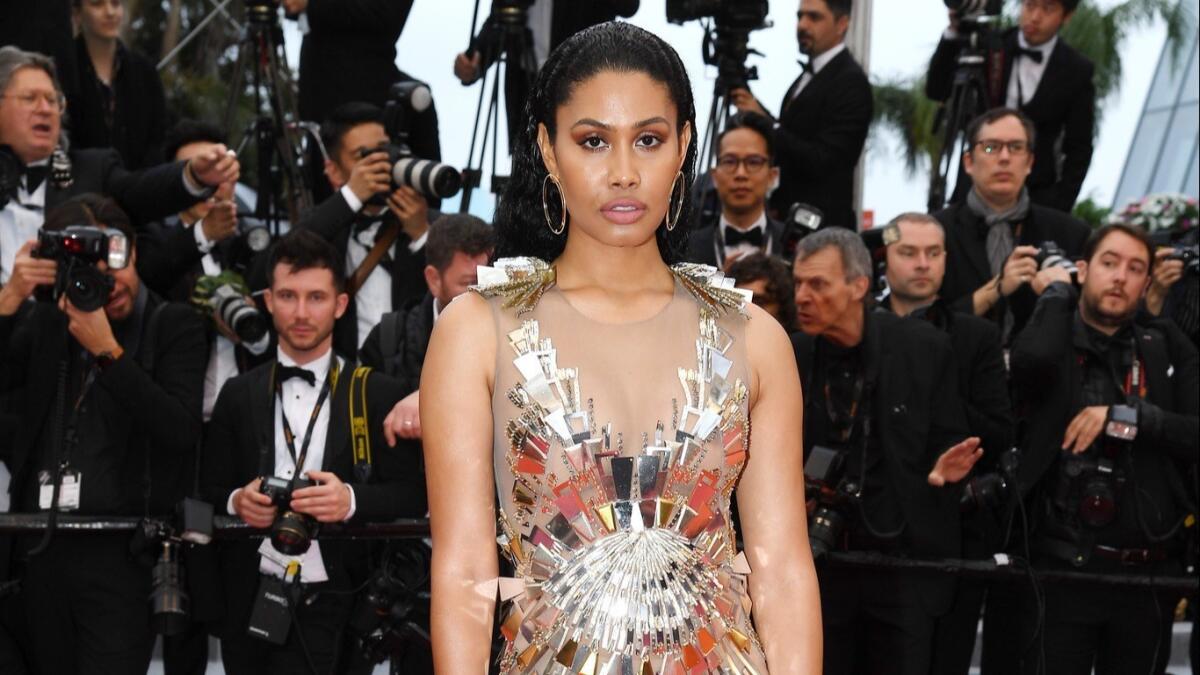How Leyna Bloom became the first transgender actress of color to star in a film at Cannes

- Share via
Reporting from Cannes, France — Leyna Bloom turned up at the Port Authority bus terminal at 17 with one red suitcase and nowhere to put it. She’d saved up a little money working part time at McDonald’s and Starbucks on the South Side of Chicago, the place she’d left behind 22 hours before. But it wasn’t enough to pay rent, so she spent her first few weeks sleeping on the train, traveling between SoHo and Chelsea and Alphabet City, surviving on $1 slices of pizza.
She’d come to New York City in the hopes of being discovered. She felt she needed to take her life into her own hands after dropping out of the Chicago Academy for the Arts months earlier. When she was granted a scholarship to the prestigious dance program in her sophomore year, she’d already transitioned. But the school would recognize only the gender she was assigned at birth. She wanted to be a dancer, and feared this could be her only shot. So she shaved off all of her hair, bought boy’s clothing and started presenting as a male.
For the record:
3:30 p.m. May 21, 2019An earlier version of this post said that Leyna Bloom appeared on the cover of Vogue India. She appeared inside the magazine, not the cover.
“I slowly started to fall into pressure, but I wasn’t living my most authentic self,” Bloom, now 25, recalled. “I was living my life for people saying, ‘You are a boy.’ I was like, ‘I don’t fit this.’ I’m gonna do pas de deux as the male? I’m the woman, I’m the soloist, I’m the princess! Life is too short to be someone who someone else wants me to be. I don’t want to be stashed away. I want to be living out loud and proud.”
So when the academy refused to allow her to dance as a female — or even transfer departments to, say, musical theater — she decided to head to the Big Apple. She trusted, she said, that “the universe will never put you in a position you can’t handle,” and she was right.
Slowly, in between waiting tables, she started to gain traction as a model. In 2017, she became the first openly transgender woman of color to appear in Vogue India. She landed an international advertising campaign for H&M and Moschino. She strutted on the runway for Tommy Hilfiger during Paris Fashion Week.
And on Saturday, she became the first transgender actress of color to star in a movie at the Cannes Film Festival. The film, Danielle Lessovitz’s “Port Authority,” bears eerie resemblance to Bloom’s own life. Produced by Martin Scorsese, it follows a young Pittsburgh transplant (“Dunkirk’s” Fionn Whitehead) who turns up at the bus station with nowhere to stay. He soon crosses paths with Wye (Bloom), a fixture on the Kiki ballroom scene, and starts to fall for her. But when he realizes she’s transgender, he becomes unsure of whether he wants to continue their romance.

I want people to look at my movie and ... say: ‘Your movie changed my life. It inspired me and gave me the oomph I needed.’
— Actress Leyna Bloom on her Cannes Film Festival premiere “Port Authority”
Bloom is fully aware of the importance of her presence in the South of France this week.
“A lot of places I go in the world, I’m the first to do something. This is a continuation of having to go through that, and it’s a very surreal moment,” Bloom said, a few hours after getting off a plane from New York, where she lives in Brooklyn. She was sitting at a crepe restaurant across the street from her hotel, dressed in a minidress and wearing her sunglasses inside.
“Me growing up seeing ‘Pretty in Pink’ and ‘Flashdance’ and all these leading females — you’re like, ‘I want to do this, I want to have a moment like this,’” she continued. “I want people to look at my movie and have people say: ‘Your movie changed my life. It inspired me and gave me the oomph I needed.’ I didn’t have that with trans women.
“Trans women were completely non-visible in pop culture unless it was on ‘Maury’ or ‘Jerry Springer.’ I don’t want to be a gimmick or a source of entertainment — I want to be respected. So when this opportunity came, I was like, ‘This is a way to bring respect to my community.’ ”
Casting directors Damian Bao and Kate Antognini found Bloom at a voguing ball in Philadelphia. She’d been a part of the ballroom community since she was 15, when she began walking in the Face category and picking up trophies and checks for $500 or $1,000. When she heard what the indie film was about, Bloom felt like the part was meant for her.
“I’m not just trying to act as a trans woman in ballroom — I am a trans woman in ballroom playing a character,” she said. “It’s very real and it’s very raw and it means a lot to me, because I am in this moment representing the most marginalized community in the world. I was thinking of all the trans women that led this path for me to walk down: Octavia St. Laurent, Tanay Pendavis, Carmen Xtravaganza, Onjenae Milan. You may not know these names, but these are my heroes. These are women that paved the way for me to be here, and their dreams and their wants and their needs are breathing through me. So it’s a huge responsibility to me.”
Lessovitz — who said she never for a moment “considered hiring someone who wasn’t trans” to play Wye — relied heavily on Bloom throughout production. Whenever the two young lovers were intimate on screen, the director asked the actress to guide the sex scenes.
“It’s a hard conversation to have with someone in a professional context, but it was like, ‘OK, Leyna, what’s your favorite position? How do you feel most loved?’ And that’s what we did,” recalled Lessovitz. “It was so brave of her to trust us, that we were going to honor her experience. It was her first film, and her first time baring herself like this with a film crew. Knowing all the trauma that’s around these girls and how their bodies are viewed by other people? She’s such a hero.”
Whitehead, Bloom’s scene partner, said he also tried to take a backseat onset. The two met for the first time a week before production began, and Bloom took him to her favorite spots in the city — a restaurant in Harlem, a museum, the movie theater.
“So then when we got onset we felt like we knew each other,” Whitehead said. “I just sort of stepped back, because she was very clear on her decisions. Especially in the [sex scenes], which are like choreography, almost. You’ve got to defer to the woman and make sure she’s always comfortable. So it became like a dance, figuring out what was OK.”
Like Wye, Bloom’s boyfriend is also a cisgender white man — an admirer from Serbia who slid into her direct messages on Instagram about a year ago. But she said she’s well aware that like Whitehead’s character, many straight men are fearful they’ll be judged for being attracted to a trans woman.
“Men are raised to be the protector and provider — you can’t be weak, you have to be strong,” she said. “And dating a trans woman is considered to be weak — or you’re fetishizing, you have a sexual attraction to something that is not real. But when I’m cut, I bleed just like you. I’m real.”
Despite being in a healthy romantic relationship, Bloom said she often feels her otherness. Because she still does not yet have an acting or modeling agent, she makes end meet by working as a hostess or waitress. But she’s had to find new jobs repeatedly because of discrimination.
“If I’m working at a dope-ass restaurant in the city, I clock in like everyone else. I come here to do my job, I show up, I show out. And then a little birdie or somebody whispers, and it completely changes the tone in the room,” she said. “That takes away from the menu and the experience. The focus is now on: ‘Did you know she was transgender?’ … As soon as that moment happens, my love for the opportunity and the job dies and it’s like, ‘OK, I need a new place to start over.’ And that sucks. I need to find places that fit who I am.”

Did you hear they’re making a movie about Cleopatra? I want to play that character.
— Leyna Bloom on her career aspirations
But she’s trying to focus on the positive, like, you know, walking the red carpet at Cannes, where she said numerous high-profile designers offered to dress her. She ultimately went with a mirrored silver gown by Alberta Ferretti that she felt evoked her black royalty —- the goddesses of Egypt, Nefertiti, Cleopatra — because she wanted to depict a trans woman as a “princess or a queen — a beautiful, ethereal creature to be revered.”
“Did you hear they’re making a movie about Cleopatra? I want to play that character,” she said. “I want to keep having those historical moments. I want to be a Bond girl. I want to be in the ‘X-Men.’ I want to do things that have never been done before.”
FULL COVERAGE: Cannes Film Festival »

Twitter: @AmyKinLA
More to Read
Only good movies
Get the Indie Focus newsletter, Mark Olsen's weekly guide to the world of cinema.
You may occasionally receive promotional content from the Los Angeles Times.











